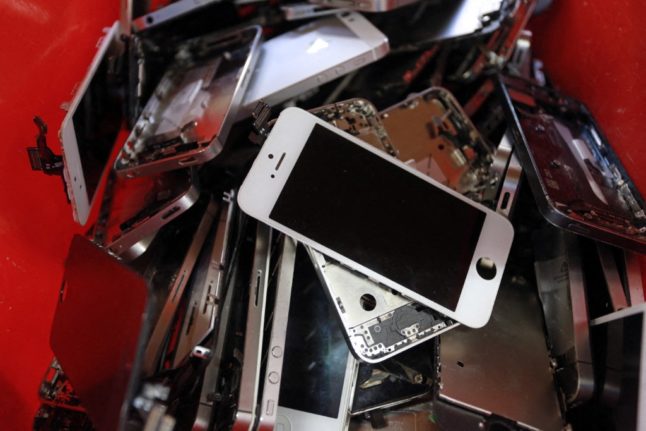From 2024, a smashed phone screen or damaged laptop will be added to the items that qualify for a ‘repair bonus’ – with €25 to go towards phone repairs and €50 for laptops.
In 2022, France launched a ‘repair bonus’ for electronic goods, which helps households fix white goods and small electronic items when they break, rather than simply tossing them out.
It is part of the landmark legislation – the Loi relative à la lutte contre le gaspillage et à l’économie circulaire (law on anti-waste and towards a circular economy, also called “loi Agec”) – which was passed in 2020 and phases in new measures up until 2026.
Several different items are eligible for the flat-rate bonus, which is automatically deducted from your invoice, including washing machines, dryers, kettles, and even DVD players. You can see the list of all 73 items eligible here.
READ MORE: How you can now save money in France if you need to repair electrical goods
But the tech that most people rely on day in and day out qualify as well, and starting in 2024, the French government will expand the help households can get when trying to fix a smartphone or laptop.
Keep in mind that some of these devices require a threshold for the total cost of the repairs, and the item must not be covered by insurance or under a warranty. The damage must also affect the item’s functionality, meaning small problems like minor scratches would not be covered.
Smartphones – the electronic bonus can help pay for repairs to your battery, speaker, microphone and photo lens. Starting in 2024, screen damage will also be covered by the bonus. Overall, you can claim up to €25 in assistance for smartphone repairs. The bonus also allows up to €15 in repairs for landline phones.
Laptops – aside from software issues, you will be able to get up to €50 in 2024 to get your laptop fixed. This is an increase of €5 from the 2023 amounts.
The threshold for the minimum cost of repairs will also decrease in 2024, from €180 to €150.
Desktops (‘tout-en-un’) – these devices will become eligible for the repair bonus in 2024. Consumers will be able to claim up to €50 in assistance for repairs as long as the total repairs cost more than €150.
Monitors – these devices will also be added to the repair list in 2024, with households eligible for a ‘bonus’ of up to €30. Keep in mind this will only be available as long as total repairs cost at least €100.
TV Screens – in 2024, households will see the repair bonus for TV screens double from €30 to €60.
How to benefit
In order to benefit from the repair bonus, log on to the ecosystem.eco website to find a registered nearby repair service. Any discount will be automatically deducted from the invoice.
The item must have a nameplate or identification (IMEI number), and if the total repair bill (including VAT) ends up less than the amount of the bonus then you will not be eligible.
The work must be carried out by a professional who has been awarded the QualiRépar mark. You can find the list on the Ecosystem website.
As of 2022, only 500 professionals across France had been awarded the QualiRépar mark, but there has been an effort to expand the qualification to more workers.
A repair bonus can also apply to repairs of clothes and shoes – full details here.



 Please whitelist us to continue reading.
Please whitelist us to continue reading.
Member comments